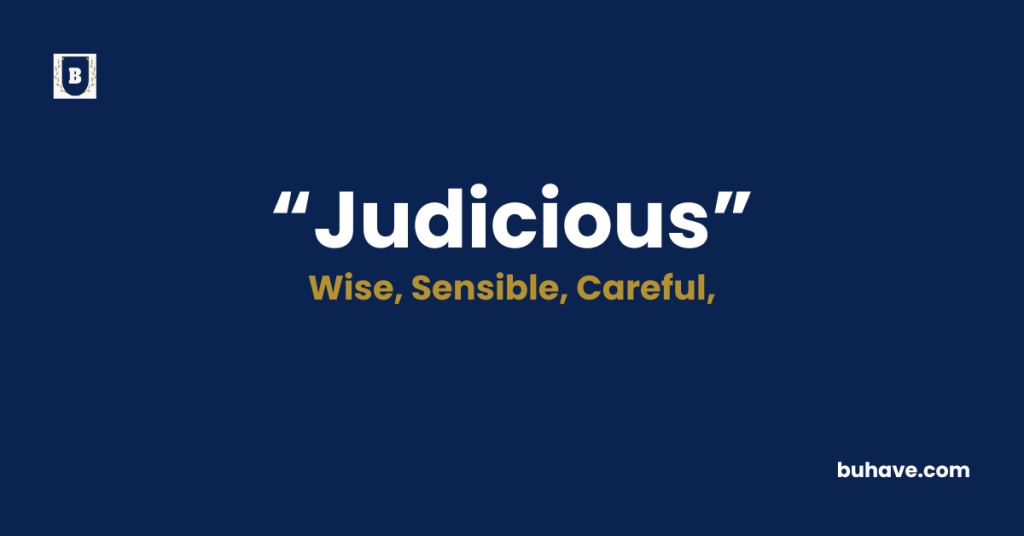The word ‘Judicious’ (Adjective) describes someone who makes decisions based on careful thinking and good judgment. First of all, when someone is described as judicious. in this guide, you’ll learn the full definition, synonyms, antonyms, etymology, and real-life examples of how to use ‘Judicious’ correctly in sentences.
Judicious Explained in Depth
A complete and detailed guide to the words Judicious including meaning, definition, examples, etymology, synonyms, and antonyms.
Meanings of Judicious
Judicious” refers to someone who shows good judgment and makes decisions carefully, considering all factors involved. First of all, when someone is described as judicious, it means they are wise and thoughtful, rather than impulsive or hasty.
Moreover, a judicious person often takes time to analyze situations, weighing the pros and cons before taking action. In addition, judiciousness extends beyond just making smart choices; it also involves balancing different perspectives and acting with caution. As a result, people see a judicious individual as someone who can be trusted to make decisions that are both fair and sensible.
Therefore, “judicious” emphasizes the importance of careful thought, fairness, and wisdom in decision-making.
Definition:
“Judicious” describes someone who makes decisions based on careful thinking and good judgment. First of all, when someone is described as judicious, it means they take time to consider all aspects of a situation before acting.
Moreover, a judicious person is often wise and thoughtful, avoiding impulsive or hasty choices. In addition, this person balances various factors and perspectives, ensuring their decisions are fair and sensible. As a result, others tend to trust their judgments because they show wisdom and caution.
Therefore, being in emphasizes the importance of careful decision-making that leads to thoughtful, balanced outcomes.
Etymology:
The word “judicious” comes from the Latin word “judicium,” which means “judgment” or “a decision”. First of all, “judicium” itself is derived from “judex”, meaning “judge” or “one who gives judgment”. Moreover, the term traveled into Old French as “judicieux” before entering the English language in the late 15th century. In addition, English speakers started using it to describe someone who displayed sound judgment, wisdom, or careful thought in decision-making. Over time, the meaning of “judicious” expanded to include not just wise decisions, but also actions that reflected fairness, balance, and thoughtfulness. As a result, the word now emphasizes careful, reasoned decision-making rather than rash or unreflective choices.
Therefore, it evolved from a focus on judgment to a broader quality of wisdom and prudence.
Example Sentence:
- First of all, the manager made a judicious decision by considering both the team’s needs and the company’s goals.
- Moreover, her judicious approach to handling the situation ensured that everyone felt heard and respected.
- In addition, he showed judicious restraint by not responding immediately to the criticism, giving him time to think.
- As a result, the judicious use of resources helped the project stay within budget and on schedule.
- Finally, the judge gave a judicious ruling, carefully weighing all the evidence before making her decision.
Judicious Synonyms:
- Wise
- Sensible
- Thoughtful
- Prudent
- Careful
- Rational
- Discerning
- Reasonable
- Astute
- Shrewd
Judicious Antonyms:
- Foolish
- Careless
- Imprudent
- Thoughtless
- Reckless
- Unwise
- Irrational
- Hasty
- Impulsive
- Shortsighted
FAQs about Judicious
Here’s a FAQ-style guide about the word “Judicious”
1. What does “judicious” mean?
“Judicious”** is an adjective that means having, showing, or done with good judgment or sense. A judicious person or action reflects careful thought, wisdom, and practicality.
2. How is “judicious” used in a sentence?
- “She made a judicious investment in renewable energy.”
- A judicious pause can make a speech more powerful.”
- The judge’s response was calm and judicious.”
3. What are some synonyms for “judicious”?
- Wise
- Sensible
- Prudent
- Thoughtful
- Discerning
- Level-headed
4. Is “judicious” a positive or negative word?
It’s strongly positive, often used to praise someone’s wisdom, restraint, or well-informed decisions, especially in important or complex situations.
5. In what contexts is “judicious” commonly used?
- Decision-making: “a judicious choice”
- Leadership: “a judicious use of authority”
- Spending/Finance: “judicious budgeting”
- Communication: “a judicious use of words”
- Law: “a judicious ruling”
6. What’s the difference between “judicious” and “judgmental”?
- Judicious means using good judgment in a wise and fair way.
- Judgmental often implies being overly critical or opinionated.
Example:
- Judicious: “He offered a fair, thoughtful response.”
- Judgmental: “She quickly criticized without understanding the full story.”
7. What is the origin of the word “judicious”?
It comes from the Latin judicium, meaning judgment. The term has been in use since the 1600s to describe actions or people guided by good sense.
Explore more J words:

















